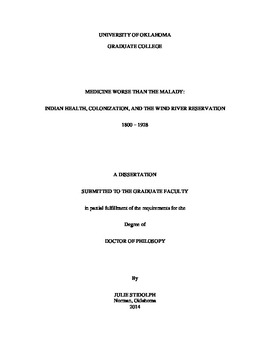| dc.contributor.advisor | Yarbrough, Fay | |
| dc.contributor.author | Stidolph Jonsson, Julie | |
| dc.date.accessioned | 2014-05-09T14:21:35Z | |
| dc.date.available | 2014-05-09T14:21:35Z | |
| dc.date.issued | 2014-05-09 | |
| dc.identifier.uri | https://hdl.handle.net/11244/10380 | |
| dc.description.abstract | At the turn of the century Native Americans represented a wide variety of cultures, economic situations, regions, and historical experiences. Yet unusually high rates of tuberculosis, trachoma, and infant mortality were a troubling and pervasive common thread that ran throughout Indian country. Despite widespread concern among Progressive era reformers and government officials, federal ideas of medical treatment often clashed with Native ideas. This dissertation uses the Wind River Reservation in Wyoming as a case study to uncover the ways discourses about Native American women and Native American health became particularly important to the federal government during the process of colonization. Colonization first obscured and then undermined the reality of Shoshone and Arapaho women’s roles in their communities and the dynamic and effective healing practices they helped maintain. Nevertheless, the historical record, including memories of Native peoples, shows an active rejection of these discourses and the government programs based upon them. | en_US |
| dc.language | en_US | en_US |
| dc.subject | History, United States. | en_US |
| dc.title | Medicine Worse than the Malady: Indian Health, Colonization, and the Wind River Reservation, 1800-1928 | en_US |
| dc.contributor.committeeMember | Metcalf, Warren | |
| dc.contributor.committeeMember | Wrobel, David | |
| dc.contributor.committeeMember | Tracy, Sarah | |
| dc.contributor.committeeMember | Bauer, William | |
| dc.date.manuscript | 2014-05 | |
| dc.thesis.degree | Ph.D. | en_US |
| ou.group | College of Arts and Sciences::Department of History | |
